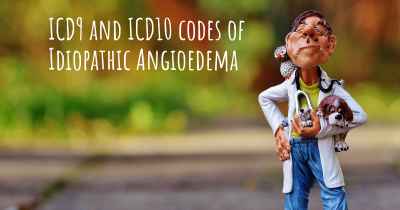Is Idiopathic Angioedema hereditary?
Here you can see if Idiopathic Angioedema can be hereditary. Do you have any genetic components? Does any member of your family have Idiopathic Angioedema or may be more predisposed to developing the condition?

Idiopathic Angioedema is a condition characterized by sudden swelling beneath the skin, typically around the face and throat. The exact cause of this condition is unknown, hence the term "idiopathic." While some cases of angioedema are hereditary, there is no clear evidence to suggest that idiopathic angioedema is directly inherited. It is believed to be a complex interplay of genetic and environmental factors. If you suspect you have idiopathic angioedema, it is important to consult with a healthcare professional for proper diagnosis and management.
Is Idiopathic Angioedema hereditary?
Idiopathic Angioedema is a condition characterized by recurrent episodes of swelling in various parts of the body, including the skin, mucous membranes, and internal organs. It is considered idiopathic because the exact cause is unknown. While there are several types of angioedema, including hereditary angioedema (HAE), idiopathic angioedema is not typically considered hereditary.
Understanding Idiopathic Angioedema:
Idiopathic angioedema is a diagnosis of exclusion, meaning it is diagnosed when other known causes of angioedema, such as allergic reactions or certain medications, have been ruled out. The swelling in idiopathic angioedema is thought to be caused by the release of certain chemicals in the body, such as histamine, which leads to increased permeability of blood vessels and subsequent fluid accumulation in tissues.
Genetic Factors:
While idiopathic angioedema is not directly inherited, there may be genetic factors that contribute to an individual's susceptibility to developing the condition. Genetic variations in certain genes involved in the immune system and inflammatory response have been identified in some individuals with idiopathic angioedema. These genetic factors may influence an individual's predisposition to developing the condition or the severity of their symptoms.
Family History:
Although idiopathic angioedema is not typically inherited, there have been rare cases where multiple family members are affected. This could be due to a shared genetic susceptibility or exposure to similar environmental triggers. However, it is important to note that the majority of cases of idiopathic angioedema occur sporadically, without a family history of the condition.
Environmental Triggers:
Idiopathic angioedema can be triggered by various factors, including certain foods, medications, infections, stress, and environmental factors. These triggers can lead to the release of inflammatory mediators, causing the characteristic swelling. Identifying and avoiding these triggers can help individuals with idiopathic angioedema manage their condition and reduce the frequency and severity of episodes.
Diagnosis and Treatment:
Diagnosing idiopathic angioedema involves a thorough medical history, physical examination, and exclusion of other potential causes. Laboratory tests, such as blood tests and allergy testing, may be performed to rule out underlying conditions. Treatment for idiopathic angioedema focuses on managing symptoms and preventing or minimizing episodes. This may involve the use of antihistamines, corticosteroids, or other medications to reduce inflammation and swelling. In severe cases, emergency treatment with epinephrine may be necessary.
Conclusion:
In summary, idiopathic angioedema is not typically considered hereditary, but there may be genetic factors that contribute to an individual's susceptibility to the condition. While the exact cause of idiopathic angioedema remains unknown, it is important for individuals with the condition to work closely with their healthcare providers to identify triggers and develop a personalized management plan. By understanding the potential genetic and environmental factors involved, individuals can take steps to minimize the impact of idiopathic angioedema on their daily lives.








